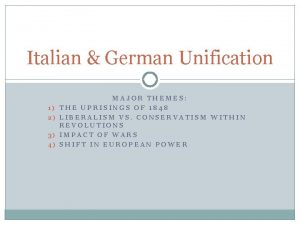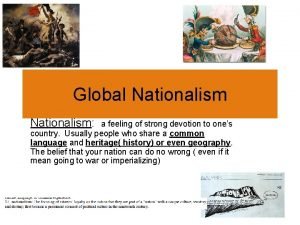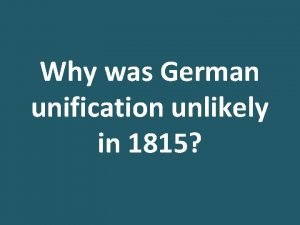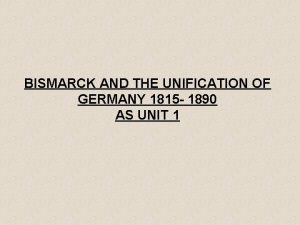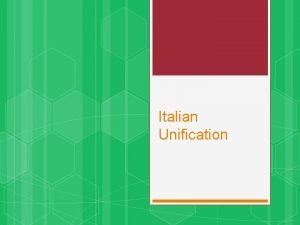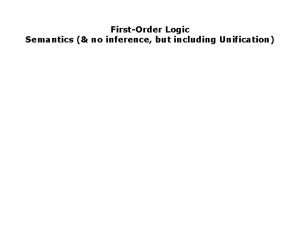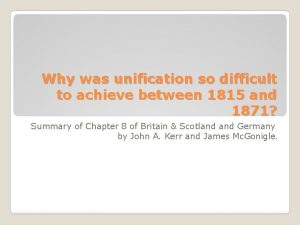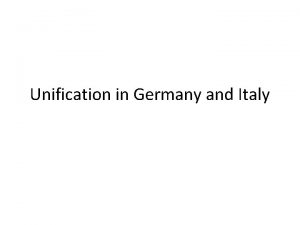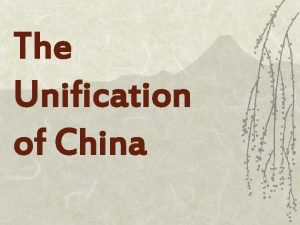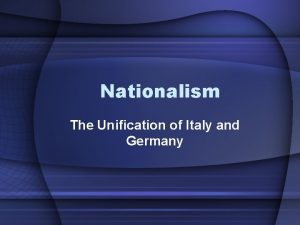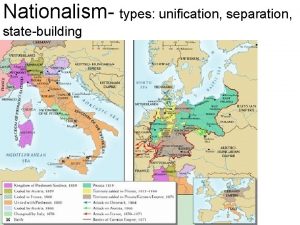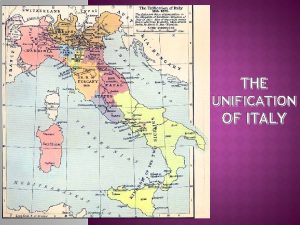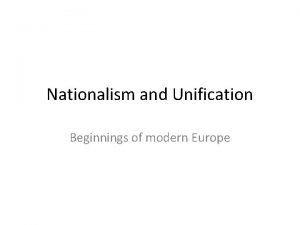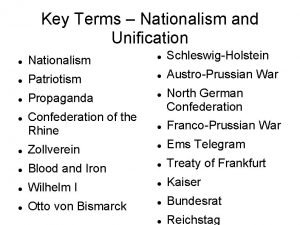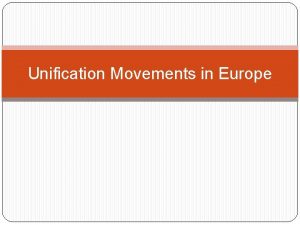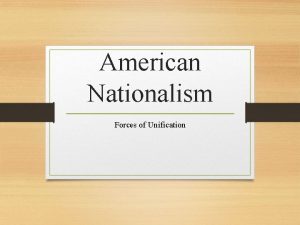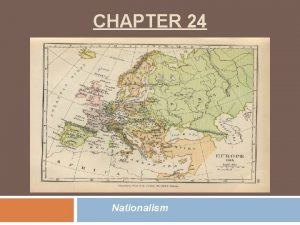The Unification of Germany Development of Nationalism in










![The Danish War [1864] The Danes never have a chance! In fact, the Prussians The Danish War [1864] The Danes never have a chance! In fact, the Prussians](https://slidetodoc.com/presentation_image_h/81b246ca920a079c8e352d1d1bd9ae8a/image-11.jpg)
![Austro-Prussian War [Seven Weeks’ War], 1866 However, the alliance between Austria and Prussia was Austro-Prussian War [Seven Weeks’ War], 1866 However, the alliance between Austria and Prussia was](https://slidetodoc.com/presentation_image_h/81b246ca920a079c8e352d1d1bd9ae8a/image-12.jpg)


![Franco-Prussian War [1870 -1871] The French didn’t know what they got themselves into. Bismarck’s Franco-Prussian War [1870 -1871] The French didn’t know what they got themselves into. Bismarck’s](https://slidetodoc.com/presentation_image_h/81b246ca920a079c8e352d1d1bd9ae8a/image-15.jpg)
![Treaty of Frankfurt [1871] Ended the Franco-Prussian War France paid a huge indemnity and Treaty of Frankfurt [1871] Ended the Franco-Prussian War France paid a huge indemnity and](https://slidetodoc.com/presentation_image_h/81b246ca920a079c8e352d1d1bd9ae8a/image-16.jpg)

![Coronation of Kaiser Wilhelm I [r. 1871– 1888] While Wilhelm basked in his greatness Coronation of Kaiser Wilhelm I [r. 1871– 1888] While Wilhelm basked in his greatness](https://slidetodoc.com/presentation_image_h/81b246ca920a079c8e352d1d1bd9ae8a/image-18.jpg)
- Slides: 18

The Unification of Germany

Development of Nationalism in Germany • When did it began? – After the Congress of Vienna (of course) • What happened with “Germany” after the Congress of Vienna? – The Congress of Vienna created a loose confederation of German states-who were controlled by Austria-Hungary. • Who wasn’t cool with this? – Prussia

What’s up with this Prussia place anyway? • Prussia was the strongest out of the German Kingdoms. • They hated the fact that the Austrians were going to dominate the German Confederation. The Austrians had also dominated the Germanic States for years • Up until 1866, Austria was the strongest military power. The Prussians were jealous, upset. • Wanted an active role in the formation of a unified Germany. Unification was based on culture - trying to unite many Germanic speaking people who had similar history and customs

Prussia/Austria Rivalry

Let’s get it started in here! (aka German Unification) • The unification of Germany really began with King William I of Prussia • Willy wasn’t anything special, but he made a really smart decision by making OTTO VON BISMARCK Chancellor of Prussia. • Von Bismarck was the real deal. Really. He was sort of a big deal.

B to the I to the S to the M to the A to the R to the C to the K • Who was he? – The Man He put the MAN in Germany. He put the FEST in Oktoberfest He put the SCHNITZEL in Wienerschnitzel • The most important thing to know about Ov. B: – He’s the mastermind behind the unification of Germany. It was his leadership as Chancellor that will increase Prussia’s power throughout the German states, which will eventually lead to their role in being the key component in unifying the country.

Chancellor Otto von Bismarck’s tips on how to unify a country Gutentag! You want to be cool like me? Want the power, money, and respect that comes with being the “Iron Chancellor? ” Then look at these tips and PAY ATTENTION!

Tip # 1: You have to be a “real politik” • Bismarck was a follower of something called “Realpolitik. ” (And no its not spelled wrong) • This was the belief of realistic politics based on the needs of the state. • Gaining power was the most important thing-if you have to sacrifice some of your character its perfectly fine.

Tip # 2: Stop WHINING! Do SOMETHING about it! “The great questions of the day will not be settled by speeches and majority decisions—that was the mistake of 1848 -1849—but by blood and iron. ” (Guess what this speech is called? ) • Yep, nice job, it’s the “blood and iron” speech – “Blood-”sacrifice for the good of the Nation – “Iron-”the strength of your military • This is how Bismarck conducted his BUSINESS. He grew angry at the talking and negiotating of other diplomats. He was ready to show the might of the Prussians.

Tip # 3: Make sure that your “iron” is strong… • Bismarck banked Prussia’s strength, and the unification of Germany on his military. • He poured TONS of money into making the military the strongest in Europe. • This devotion to the military would eventually pay off- as Germany would be unified exactly like Bismarck predicted, through “blood and iron, ” not talking.
![The Danish War 1864 The Danes never have a chance In fact the Prussians The Danish War [1864] The Danes never have a chance! In fact, the Prussians](https://slidetodoc.com/presentation_image_h/81b246ca920a079c8e352d1d1bd9ae8a/image-11.jpg)
The Danish War [1864] The Danes never have a chance! In fact, the Prussians used the Austrians to help them defeat the Danes, who had to give up more land.
![AustroPrussian War Seven Weeks War 1866 However the alliance between Austria and Prussia was Austro-Prussian War [Seven Weeks’ War], 1866 However, the alliance between Austria and Prussia was](https://slidetodoc.com/presentation_image_h/81b246ca920a079c8e352d1d1bd9ae8a/image-12.jpg)
Austro-Prussian War [Seven Weeks’ War], 1866 However, the alliance between Austria and Prussia was short lived. REMEMBER that the Prussians always disliked the Austrians, who had dominated the German Confederation since the Congress of Vienna. Prussia Austria The weaker Austrians were no match for the powerful Prussians Do you know what the Prussians said to the Austrians?

Creation of the Northern German Confederation, 1867 Shortly following the victory of Prussia, Bismarck eliminated the Austrian led German Confederation. He then established a new North German Confederation which Prussia could control Peace of Prague

Final Determination of Boundaries • To finally ensure unification of all desired territory, Bismarck provoked a fight with the French. The German states united, and the French had to cede Alsace and Lorraine to Germany.
![FrancoPrussian War 1870 1871 The French didnt know what they got themselves into Bismarcks Franco-Prussian War [1870 -1871] The French didn’t know what they got themselves into. Bismarck’s](https://slidetodoc.com/presentation_image_h/81b246ca920a079c8e352d1d1bd9ae8a/image-15.jpg)
Franco-Prussian War [1870 -1871] The French didn’t know what they got themselves into. Bismarck’s army not only beat the French, they destroyed them. It was an embarrassment for the French, and a huge achievement for the Germans. This meant that the Germans were now the dominant power on continental Europe. German soldiers “abusing” the French.
![Treaty of Frankfurt 1871 Ended the FrancoPrussian War France paid a huge indemnity and Treaty of Frankfurt [1871] Ended the Franco-Prussian War France paid a huge indemnity and](https://slidetodoc.com/presentation_image_h/81b246ca920a079c8e352d1d1bd9ae8a/image-16.jpg)
Treaty of Frankfurt [1871] Ended the Franco-Prussian War France paid a huge indemnity and was occupied by German troops until it was paid. France ceded Alsace-Lorraine to Germany [a region rich in iron deposits with a flourishing textile industry].

German Imperial Flag German for “Empire. ”
![Coronation of Kaiser Wilhelm I r 1871 1888 While Wilhelm basked in his greatness Coronation of Kaiser Wilhelm I [r. 1871– 1888] While Wilhelm basked in his greatness](https://slidetodoc.com/presentation_image_h/81b246ca920a079c8e352d1d1bd9ae8a/image-18.jpg)
Coronation of Kaiser Wilhelm I [r. 1871– 1888] While Wilhelm basked in his greatness as the leader of the German Empire, everyone knew who was really in charge. It was Ov. B!
 Chapter 23 lesson 3 nationalism unification and reform
Chapter 23 lesson 3 nationalism unification and reform Zollverein germany map
Zollverein germany map Strong devotion
Strong devotion St an
St an Why did germany avoid “wounding austria too severely”?
Why did germany avoid “wounding austria too severely”? Germany before 1871
Germany before 1871 Nationalism in italy and germany
Nationalism in italy and germany Liberalism and nationalism in germany 1815-71
Liberalism and nationalism in germany 1815-71 Nationalism case study italy and germany
Nationalism case study italy and germany Principles of nationalism
Principles of nationalism Prolog langage
Prolog langage Unification of italy summary
Unification of italy summary What was the most serious obstacle to german unification?
What was the most serious obstacle to german unification? Unification operating model
Unification operating model Fol unification
Fol unification Why was italian unification difficult to achieve
Why was italian unification difficult to achieve German and italian unification compare and contrast
German and italian unification compare and contrast Unification of china
Unification of china Prolog unification
Prolog unification

